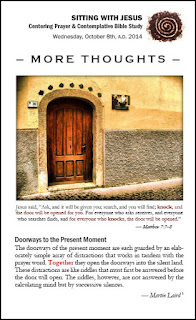In Mark 6:45-53, Mark recounts the episode of Jesus walking on the sea. The disciples have been sent to the other side of the sea, but they struggle through the night against an adverse wind. When Jesus comes to them, walking on the sea, the narrator says something very curious, "He intended to pass by." Moreover, the episode ends with a very enigmatic statement. “And they were utterly astounded, for they did not understand about the loaves, but their hearts were hardened” (6:52). So what's going on here in Mark, and how might it relate to us?
ENSURING THAT CHANGE IS A SUSTAINABLE BLESSING
I have a good friend named Rob Voyle (clergyleadership.com). I first met Rob at the
General Convention in Anaheim, California in 2009. We met through a mutual
friend, and we both had booths in the convention hall. At the end of the first
full day, Rob came by my booth, and said with his New Zealand accent, “Let’s go
get a beer, mate.” I was tired, and I don’t actually like beer, but I went along
anyway, and I am glad I did because Rob is brilliant. Rob is a priest, a
psychologist, and a consultant.
In his work as a church consultant, folks often say to Rob,
“People don’t like change, especially church people.” But Rob disagrees. It’s
not change per se that people don’t like, but the type of change that people
will either accept or reject. “People don’t want to be changed; they want to be
blessed” (Dr. Stephen Gilligan). For example, if you get a raise at work, you’re
happy; that’s the sort of change you like. So if you have ever experienced a
blessing in life, you have experienced some kind of change. And that is Rob’s
passion in life, helping people and organizations ensure that the changes they
seek to make are sustainable blessings.
The Kingdom of God
When Jesus announced the arrival of God’s kingdom, he was announcing
change. “The kingdom of God is at hand; repent—be changed—and believe the good
news” (1:15). Now some people experienced the kingdom as a blessing, not least
those whom Jesus healed by the power of the kingdom. But others, such as the
scribes and Pharisees, opposed the Jesus’ kingdom proclamation, for they did
not perceive him or his message as a blessing.
But it wasn’t just religious opponents who exhibited
resistance. On occasion, Jesus’ own disciples show signs of resisting the
kingdom of God. That’s what we see in today’s gospel. And again, it wasn’t
simply that the disciples didn’t like change. After all they gave up their
livelihoods to follow Jesus because they believed that life with Jesus was
better than life without Jesus. But they did not welcome every change that the
kingdom entailed. And that’s what I want us to look at today.







